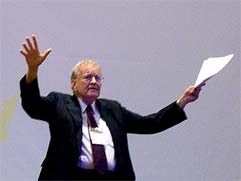 |
| Speaker
John Rigden captivated congress attendees with his
expertise on the history of Albert Einstein and his
groundbreaking work. |
|
Author
and Historian John Rigden gave a very enthusiastic background
on arguabley one of the most famous scientists of all time,
Albert Einstein. Dr. Rigden provided the history of Einstein
and his work from his early days as a patent clerk to his
final days after he immigrated to the United States. One
notable point in his speech was Einstein's influence on
the Manhattan project development by his influential presence
in the White House. Along with this, Dr. Rigden talked about
Einstein’s predictions throughout his career and how
initially they were ridiculed but later declared as ingenious
and accepted by the scientific community. I had the pleasure
of interviewing Dr. Rigden prior to the dinner banquet that
night:
Q:
How does it feel being one of a select few distinguished
speakers at the 2004 Quadrennial Congress of Sigma Pi Sigma?
A: “It’s absolutely wonderful.
I'm honored, anxious and nervous all at once”
Q:
You have had several prestigious jobs and taken part in
many important events in physics, what in your mind stands
out as either one you’ll never forget or one you feel
is the most important?
A: “What’s important to me
has changed over time as I think it has with any one. I
loved being in school and having my future ahead of me.
I loved being a professor and teaching young people the
importance of asking the big questions. I loved being an
Administrator and overseeing the development of the school.
Right now I love being retired and writing these books for
the general public hopefully illustrating the importance
our history and the promise of our future.”
Q:
You’ve written and co-edited several acclaimed physics
books, most recently being Einstein 1905: The Standard of
Greatness, what motivated you to write these books? Have
your experiences as an undergraduate or graduate shaped
the ideas behind your books?
A: “Well when I taught an introduction
to physics course, I decided to take a history viewpoint
on it. I had success with my students and decided that this
would be a good book. When I looked and no book had been
written like that before I decide maybe I should write one.
One thing that was interesting was having it reviewed. I
had it reviewed by both a physicist and historian. The physicist
gave a simple straight forward review while the historian
picked away at the details behind my book. I was interesting
to see the differences there.”
Q:
If you were an undergraduate today, what field of research
would you go into and why?
A: “Atomic Physics, trapping atoms
to test quantum mechanics. Einstein didn’t believe
in quantum till the day he died and look at what we’ve
proven from his predictions. It really gives you something
to think about.”
|